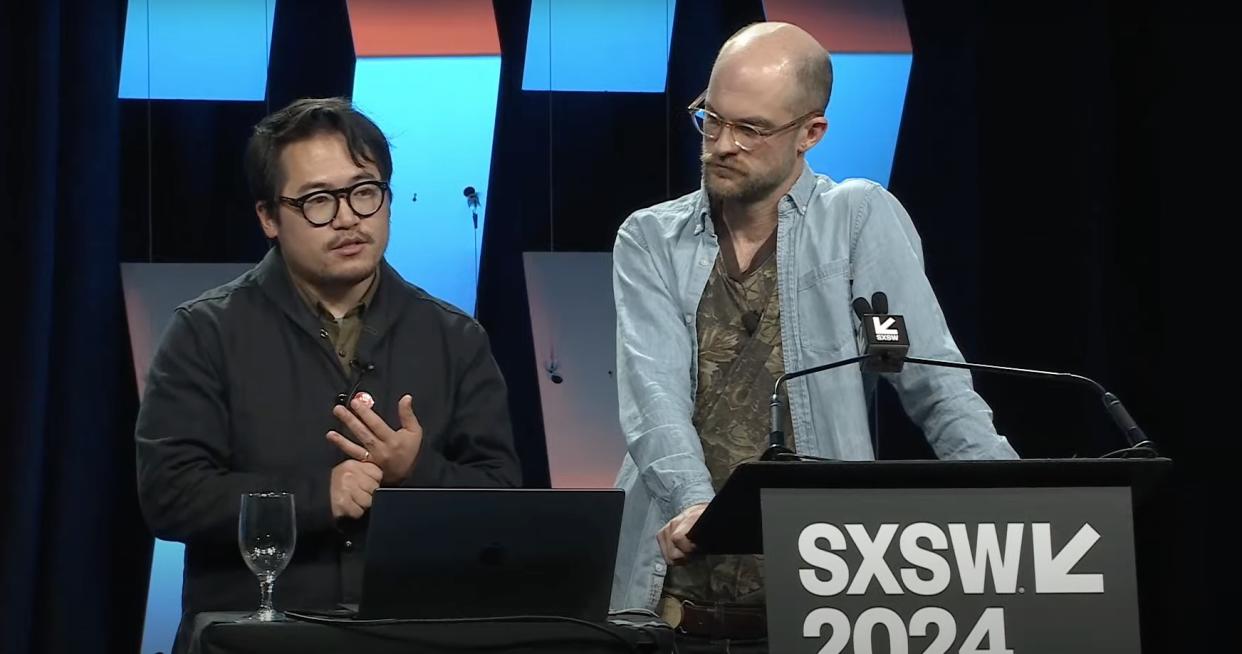Anti-AI sentiment gets big applause at SXSW 2024 as moviemaker dubs AI cheerleading as 'terrifying bullsh**'

A whiff of anti-AI sentiment got big applause at the SXSW conference in Austin on Tuesday afternoon. Award-winning writers and directors Daniel Kwan and Daniel Scheinert, collectively known as "DANIELS," originally premiered their film "Everything Everywhere All at Once" at SXSW in 2022. The movie later went on to win seven Oscars, including Best Picture, Best Director, and Best Screenplay. In a conversation about the future of storytelling at this year's SXSW on Tuesday, the duo commented on the inevitable rise of AI and how to approach it, calling the technology both "amazing" and "terrifying."
As Kwan first explained, modern capitalism only worked because we compelled people to work, rather than forced them to do so.
"We had to change the story we told ourselves and say that 'your value is your job," he told the audience. "You are only worth what you can do, and we are no longer beings with an inherent worth. And this is why it's so hard to find fulfillment in this current system. The system works best when you're not fulfilled," he said, then paused. "Which brings me back to AI," Kwan continued to a thunder of applause and cheers.
Remarking that the crowd must love AI, given the hoots and hollering that was being heard, Kwan admitted that many people will call the technology amazing and he agreed.
"It's magic," he said. "It's probably going to solve cancer. It's probably going to give us a lot of climate solutions. This is a powerful thing," Kwan continued. "But I'm really terrified of what this new story we're going to have to tell ourselves in order to accept this new convenience, this new progress. It's terrifying," he added as a single solitary voice cheered in the now otherwise quiet crowd.
"So imagine what this technology will do within this current system, within this current incentive structure. This is the same system that brought us climate change, income inequality, and the general lack of gratitude and understanding of our worth and the worth of those around us," Kwan said.
Plus, he noted, if you are feeling anxious about AI, it's probably because, deep down, you know you're next. "Even if the jobs aren't going to be lost, the value of the job will go down, right? … It will slowly be compounded and normalized until we don't even realize it," he said.
Kwan pointed to how social media had already altered our story. A technology meant to connect us ended up making us lonelier than we have ever been. But, with AI, we still have the opportunity to "rewrite the stories and rewrite the systems for tomorrow," he explained.
Still, he cautioned that didn't mean we could choose to ignore AI's progress or even its usefulness.
"I also want to say, we're not saying 'don't use AI.' I don't believe in dogmas. I don't believe in that kind of puritanical lifestyle -- it doesn't work. AI is here. It is going to be rapidly deployed in every aspect of our life," Kwan said.
Scheinert agreed, adding that, instead, people should think about why they're using AI.
"Are you trying to use it to create the world you want to live in? Are you trying to use it to increase value in your life and focus on the things that you really care about? Or are you just trying to, like, make some money for the billionaires, you know?" Scheinert asked the audience. "And if someone tells you, there's no side effect. It's totally great, 'get on board' -- I just want to go on the record and say that's terrifying bullshit. That's not true. And we should be talking really deeply about how to carefully, carefully deploy this stuff," he said.
The crowd then erupted into sustained applause.
They, too, had their reservations about AI, it seemed.
Kwan jumped back in to add that people need to look at why it "feels so wrong to use AI," while also surviving this current environment where AI will basically be everywhere. He also reminded the audience why we create art.
"Why did we write 'Everything Everywhere All at Once' the way we did? And the answer is, we did it to save ourselves. Every story … that we make is an act of saving ourselves and our value from a system that wants to devalue us and the people that we care about," Kwan said.

 Yahoo Lifestyle
Yahoo Lifestyle 
